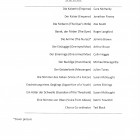Frau ohne Schatten 2015Edinburgh Players Opera Group
Read more about the opera Frau ohne Schatten
After several years of undiluted Wagner, the enthusiastic members of the Edinburgh Players Opera Group (EPOG) last year switched to Richard Strauss, with a weekend of workshops devoted to Der Rosenkavalier. Their ambitions are clearly unsated, and this year they plumped for the biggest of Strauss's operatic scores, which was given its belated Scottish premiere by the Mariinsky in 2011. Despite the name, EPOG draw players from across the country and abroad.
At the concert performance on the final day the band of over eighty produced some glorious sounds throughout the exhausting work. Thanks to Mike Thorne's disciplined direction, there were remarkably few moments of hesitancy, and, in spite of occasional imbalances in the sound emerging, the results were impressive and even thrilling.
Several familiar singers returned to help out in shorter roles. Of the principals, only the indefatigable tenor Jonathan Finney was recognised from previous events here, and his performance of the Emperor equalled his previous appearances in the big Wagner roles. Several newcomers were enticed along to contribute, perhaps trying out parts that are unlikely to come their way again soon. Roger Langford succeeded in presenting Barak as a three-dimensional human. His wife was portrayed by Zoë South with the full range of dramatic outpourings this demanding role requires. Their handling of the great reconciliation duet 'Mir anvertraut' was effectively moving.
The second huge role for dramatic soprano, the Empress, was approached with enormous confidence by Cara McHardy. The awkward vocal leaps littered through the part were taken in her stride, and there was no sign of fatigue at any stage. The villain of the piece, the Empress's nurse, is a demanding part for dramatic mezzo, and it seemed to suit Jemma Brown's rapidly developing voice well.
Of the other singers, James Slimings made an instant impression as the sweet-voiced youth, and Barak's three brothers were also clearly presented. The Spirit Messenger and various supporting voices were well in the picture, and there were also small groups of choristers to provide the other 'offstage' voices of watchmen, servants and unborn children.
Altogether this was something of a triumph for EPOG, and all the participants can be justifiably proud of their achievement. What will they do next? Several Strauss operas still await Scottish premieres. Whatever they decide on, the date next year for the 'performance' to which the public is admitted, is Sunday 25 September.
Click on the images to enlarge them.
Performance Cast
- Nurse to the Empress
- Spirit Messenger from Keikobad
- Emperor of the South Eastern Islands
- Empress his wife, daughter of Keikobad
- Voice of a Falcon
- Barak's hunchback brother
- Barak's one-eyed brother
- Barak's one-armed brother
- Barak's wife
- Barak a dyer
- Apparition of a youth
- Voice from above
- Guardian of the threshold



